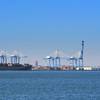The introduction of the International Ship and Port Facility (ISPS) Code on 1 July 2004 is more likely to increase rather than reduce the problems caused by stowaways to shipowners, warns North of England P&I club.
In a supplement to the latest issue of its risk-management newsletter 'Signals', the club concludes: 'Resolving stowaway cases can only get more difficult after the introduction of the ISPS Code, which makes prevention all the more crucial.'
North of England points out that port security in many parts of the world remains extremely lax. 'It is hoped that the ISPS Code will improve the situation and reduce the burden on shipowners,' says loss prevention executive Tony Baker.
'Regardless of efforts made by shipowners to control access to their vessels in port, the task of securing port facilities is a much larger, more complex operation and one which many ports will find difficult to achieve,' he says.
However, from 1 July 2004, the club believes hardening attitudes of port authorities towards shipowners may lead them to consider the presence of stowaways as 'clear grounds' that a ship is not complying with the ISPS Code. 'This would make the vessel subject to additional security-control measures, which would inevitably lead to further difficulties in disembarking stowaways and additional cost and delay to owners' says Baker.
The North of England in common with other International Group clubs has agreed that it will be a condition of entry that a ship has a valid International Ship Security Certificate from 1 July 2004.
The 50 million GT club has thus advised all members to take even more care in their efforts to prevent stowaways boarding, particularly via container cargoes and sea approaches to the vessel.
Featured videos

Inmarsat Enhances Service to Drive Digitalization

Tracking Foreign Vessels Working in the U.S. Jones Act Market

Inside the Electrified Truckable Tug
Subscribe for
Maritime Reporter E-News
Maritime Reporter E-News is the maritime industry's largest circulation and most authoritative ENews Service, delivered to your Email five times per week









